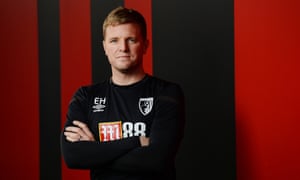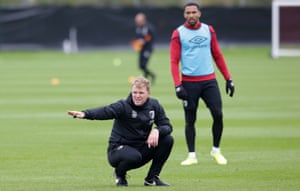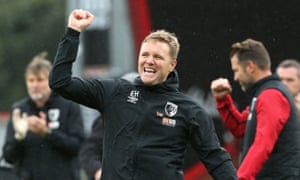Eddie Howe: ‘I don’t want to be told my team didn’t play well by my piano teacher’

“You hear a lot of players say: ‘Well, the manager put the ball down and stuck it in the top corner.’ … I’m not one of them,” Eddie Howe says, breaking into laughter, halfway through explaining how he agreed to wear a microphone at a training session during pre-season in La Manga.
The subsequent video offered a fascinating insight into Howe’s thinking, intensity and his hands-on coaching style but that line in self-deprecation is symptomatic of the Bournemouth manager’s modesty; he is a workaholic, reluctant to overindulge in the seismic strides the club has made since his first game in charge at Darlington almost 11 years ago.
“I think along the way there have been fleeting moments where I’ve gone, ‘That was really good today’ or ‘That was a big moment’. You sort of know as you go along where the big successes have come but in terms of sitting back and putting my feet up and wallowing in it … never.
“Even at the end of the season, it’s always about the next achievement, the next thing we can do. And I want to be like that – that’s how I think you get the next one. One day I’m sure I will look back with so many special memories – probably too many to even talk about – but that will be the time I’ll enjoy it.”
Howe’s journey with Bournemouth from the foot of League Two to a fifth successive season in the Premier League is unprecedented and he is hungry for the club to break new ground. He is absorbing company at Bournemouth’s training pavilion, touching on everything from A-ha to cricket and Formula One, but it is his passion for coaching and the care he has for his players that shines through, as it does in that video clip.
“They are not going to stand and clap things that I do with the ball but I do like to try, if I can, to demonstrate something, whether it is defending, attacking or movements,” says the 42-year-old, who made more than 300 appearances for Bournemouth. “I’m very there, mentally and physically, with the players and always have been, and I’d like to think that won’t change in the short term at least.”
Howe is talking on a sofa in a corner of the canteen, fresh from analysing Tottenham – Saturday’s opponents – with the first-team coach, Stephen Purches, and Garvan Stewart, the head football analyst, having spent last weekend consumed by a 2-1 defeat at home by Wolves.
A diligent and meticulous character, Howe could not allow defeat to stew. “The first thing I do when I get home is I watch the game. I’ll make notes, clip team clips, individual player clips and then build on my initial impression of the game. I don’t like that feeling of not knowing the answers or feeling I don’t know the answers. You have a lot of emotions going through you at the end of a game but on the back of a performance and a result like that I tend to attack it straight away.”
Switching off, Howe confesses, has never been his strong point. He enjoys family time with his wife, Vicky, and their three sons, Harry, Rocky and Theodore, who was born in March, and taking Eric, his boxer, for a walk along the beach as well as the odd game of snooker. He has also taken up the piano, learning predominantly classical pieces, and every Wednesday he has a half-hour lesson.
“It probably tells you why I’m not improving quick enough: one half an hour a week,” he says, chuckling. “When I’m at home I’ll try to have five minutes before I go to bed. My wife has probably got to her wits’ end hearing me play the wrong notes in the wrong order at the wrong time.
“I wanted to do it for a long time and never did and the reason I’m doing it is to try to educate my eldest son, Harry, so I can teach him what I know. So I’m being taught and then as I learn I’ll teach him, so that when he’s alone with me, I can play with him or try to help him.
“He’s got to a point now though where’s better than me already, so it’s a tough gig. It goes to show how young people adapt so much quicker than older people. He is learning and able to take it on a lot quicker than I am. I think there’s something quite therapeutic about it. You’re trying to make a nice sound – and although I don’t it is quite relaxing. Learning a new skill, although it is mentally quite draining, it’s also quite nice because it’s so different.”
It is just as well, Howe says, that his tutor is not a football fanatic. “No, I don’t want to be told my team didn’t play well last week from my piano teacher,” he says, smiling. “He’s well aware of how bad I am. He’s a very patient guy and he’s been very good with me. He goes, ‘Have you practised?’ I’ll say, ‘Aaah, I’ve got to be honest, no, I’ve had a very busy week this week.’ I’ll say, ‘I’ve had three games in a week’ and he’ll go, ‘No problem.’ He understands.”
Howe’s eldest boy is in Bournemouth’s academy, as is his assistant manager Jason Tindall’s son Levi, and Purches’s son Harry. “It’s another way I do relax, by watching him train,” he says. “I say relax … When he does well I relax and enjoy it and when he’s not doing so well, when he’s being lazy, not recovering back or not tackling, it will agitate me. To watch him enjoy the game and find a love for the game so early, it’s a great thing to see.”
As Howe describes his son’s attributes, it is easy to forget he is talking about an eight-year-old – “he’s technically good, he plays off both feet, he’s probably the opposite of what I was”– and smiles at the prospect of the trio following in their fathers’ footsteps.
Although he enjoys watching Harry from the sidelines, Howe also feels he has a responsibility to show an interest in all of the boys. “It’s important in my role as the manager of the club. There was a spell when I felt we hadn’t contacted enough of the players, so we went down to the centre of excellence and put a session on – all of my first-team staff – to make sure they know we care about every kid there.”
Arguably the most comforting thing for Howe is that Harry is no longer his harshest critic. “I think he’s learning to be a bit softer with me actually. He came home after the Wolves game and cuddled me straight away and goes: ‘That wasn’t great today, Dad, was it?’ Before he has been a lot harder with me, so I was quite appreciative of the support.”
Howe is the second-longest-serving manager in the country, behind Wycombe’s Gareth Ainsworth and the longest-serving in the Premier League. After returning to the club from Burnley, Howe has been in charge for seven years, 46 days and counting. In an unforgiving era, such permanence is almost unheard of – only five managers in the top four tiers have been in charge for longer than four years after Mauricio Pochettino became the 22nd manager to lose his job this season.
“You can look at it both ways, that’s probably the best way to put it. Brilliant that we’ve had long-term success and I’m very proud to manage the club but I know on the flip side when I talk about Mauricio, how fragile the job can be and that longevity can then be used as a weakness against you. ‘I’ve been here too long, need a change,’ all of those things, so you’re sort of battling those two things all of the time. I think there’s a lot to be said for, probably from my side, if you’re happy in the environment you are in and you are trusted by very good people above you and the conditions are right for you to do your best work, then that is worth so much. I think that would probably be a bigger thing for me than anything else.”
The million-dollar question follows: what’s the secret to such longevity? The crux of Howe’s answer is innovation and a thirst to improve – in the summer he picked the brains of those at Villarreal and Bayern Munich. “It is very easy to be lazy and churn out the same stuff because you have done it before but we have never followed that and we always try to push to create new things.”
After Pochettino’s departure, Howe says he took a moment to take stock. “Just a recheck: ‘Are we doing everything we can to be successful?’ If a manager of that quality, who has achieved what he has at Tottenham – and in my opinion was one of the league’s best managers – can get the sack so soon after getting to the Champions League final, then it can happen to anybody. For me he’s one of the best managers in the league.”
Just how much more can Bournemouth achieve on his watch? “It’s a difficult one to answer. All I would say is we can win a lot more games and ultimately that will decide what happens after that. I think this season alone we could have won near enough every game. We are a strong, competitive team. Who knows what the outcome is going to be?”







.jpeg)
Comments
Post a Comment